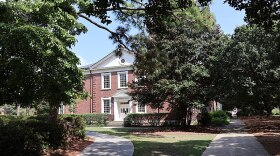UNC system schools are growing more diverse with each new freshmen class, but the system's highest level of leadership doesn't reflect its student body or the state's population.
The UNC Board of Governors has a new vacancy after Darrell Allison, one of three Black members of the board, resigned this fall.
Pearl Burris-Floyd is the only African American woman on the UNC System Board of Governors, and she feels diversity should be a higher priority for future board appointments.
"I have served on this board for a long time, and I've never served with another African American woman," Burris Floyd said, adding that the number of female board members has also declined in recent years.
Burris-Floyd has served as a Republican representative in the North Carolina House and had a long career in medical research, after graduating from UNC-Chapel Hill's medical school.

"It was because of that involvement, and a lot of times being the only woman or the only African American in certain situations that has allowed me to look at diversity issues and why it's so important to have that seat at the table," Burris-Floyd said.
Her life experience and her training in her current job as the equity and inclusion officer for Gaston County have given her a unique perspective on the board of governors.
"I love my fellow governors, but they know that I also want us to be more diverse," Burris-Floyd said.
Burris-Floyd says she would like for the board of governors to be more representative of the makeup of the UNC system student body and the state of North Carolina. She believes a more diverse board would help students feel better represented and included.
"It's not hard to look at a [board of governors] meeting and see only two African Americans, one Native American, and in that mix, only five women out of 24," Burris-Floyd said.
That's a stark comparison to UNC system students — well over half are women, 20% are Black, and about 45% are not white.
Thinking About Diversity Beyond Race and Gender
Lou Bissette is a former chair of the board of governors and still attends meetings as an emeritus member. He argues the board would benefit from more diversity, of many kinds.
"I think you need diversity in gender, race, geography, experience, political ideology, and interest," Bissette said.
Bissette notes few board members come from rural, and especially Western counties. He also argues the board would benefit from members who have a range of work experience and familiarity with a variety of the UNC system's 17 campuses. He says the allegiance board members have to one campus or another could impact how well each university's interests are represented.
Since Allison resigned this fall, there are no longer any board members who have graduated from or served as a trustee at one of the system's five historically Black universities.
"I'm not saying this happens, but if you've got four members who live around one institution, and you've got some other poor institution that's way out at the other end of the state, that these people know nothing about, a lot of times it can make a difference," Bissette says.
Then there's political representation. Currently, every member of the board of governors was appointed by Republicans, including Bissette and Burris-Floyd. Many board of governors members are also major political donors to Republican candidates.
Political affiliation on the board swings with leadership in the General Assembly, which appoints UNC system board members when vacancies arise.
Bissette says he was excited to have a chance to serve on the board when Republicans took power ten years ago, an opportunity that might not have been possible when Democrats controlled the statehouse.
"For the first two years, we had a board really that had half Democrats and half Republicans," Bissette recalled of his early years on the board. "And I thought it worked really well."
The General Assembly's Selection Process
While Burris-Floyd and Bissette contend that a board of governors that represents a variety of experiences, geographic loyalties and ways of thinking would serve the UNC system well, they aknowledge that only the General Assembly has the power to select new members.
Republican Representative John Fraley has helped recruit candidates to the board of governors appointed by the North Carolina House, and he serves on two House education committees. He says he cannot comment on the Senate's selection process for filling vacancies on the board of governors.
"But I will tell you from the House standpoint when we've sat down and looked at people, we've taken a very close look at race, gender, geography, experience, and that type of thing," Fraley said.
Fraley says that commitment shows — several of the women and minority members of the board were appointed by the House.
"It's an important discussion to have, and I think something that people are a lot more attuned to in the Legislature, then maybe they're given credit for," Fraley said.
That will be put to the test when the North Carolina Senate appoints a new member to the open seat on the board of governors.
Pearl Burris-Floyd says she respects that the decision is in the hands of the General Assembly, but she'll keep voicing her opinion.
"Anytime you start talking about equity and inclusion, people assume that nothing is going to be done," Burris-Floyd said. "But we can do better, we can do more."









